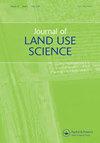还有很长的路要走:土地利用科学中的性别和多样性
IF 3.3
4区 环境科学与生态学
Q1 AGRICULTURE, MULTIDISCIPLINARY
引用次数: 6
摘要
摘要:具有不同文化背景的女性科学家和研究人员,尤其是来自全球南方的女性,在科学体系中的代表性不足。土地利用科学,甚至是在全球南方国家进行研究的研究团队也是如此。为了评估该领域性别平等、种族多样性和交叉性的趋势,我们在系统文献综述的基础上进行了一项荟萃分析,其中包括316390篇同行评审期刊文章。我们发现,在2000-2001年间,27%的作者代表女性。种族代表性偏向白人研究人员(62%),其次是亚裔(30%)、西班牙裔(6%)和黑人(2%)。在考虑作者职位时,不平等的交叉点使黑人和西班牙裔女性的代表性进一步不足,黑人女性成为土地利用科学第一作者的机会为0.6%,而白人女性的机会为19.3%。需要采取扶持行动,赋予妇女权力,以减少部门间的不平等现象,实现可持续发展目标。本文章由计算机程序翻译,如有差异,请以英文原文为准。
A long way to go: gender and diversity in land use science
ABSTRACT Female scientists and researchers with diverse cultural backgrounds, especially of the Global South, are underrepresented in scientific systems. This is also the case for land use science and even for research teams researching in Global South countries. To assess trends in gender parity, ethnic diversity and intersectionality in this field, we conducted a meta-analysis based on systematic literature review that included 316,390 peer-reviewed journal articles. We found that 27% of all authors between 2000–2021 represented women. Ethnicity representation was biased towards White researchers (62%) followed by Asian (30%), Hispanic (6%) and Black (2%) researchers. Intersection of inequalities further underrepresented Black and Hispanic women when author positions were considered, giving Black women 0.6% chance of becoming first authors in land use science in comparison to 19.3% chance of White women. Supportive actions to empower women are needed to reduce intersectional inequalities and to achieve the sustainable development goals.
求助全文
通过发布文献求助,成功后即可免费获取论文全文。
去求助
来源期刊

Journal of Land Use Science
Environmental Science-Management, Monitoring, Policy and Law
CiteScore
5.40
自引率
6.20%
发文量
26
期刊介绍:
The Journal of Land Use Science provides a central outlet for high-quality articles on theoretical and empirical aspects of land-use science at the interface of social and environmental systems. The Journal brings together an array of research perspectives at multiple temporal, spatial and social scales that contribute a better understanding of land-system dynamics and communicate scientific advances towards attaining land-system sustainability.
 求助内容:
求助内容: 应助结果提醒方式:
应助结果提醒方式:


